Archives of Whatcha Reading
Whatcha Reading, Paige Embry?
Every week we ask an interesting figure what they're digging into. Have ideas who we should reach out to? Let it fly: info@seattlereviewofbooks.com. Want to read more? Check out the archives.
Paige Embry is the Seattle-based author of the new book Our Native Bees: North Ameria's Endangered Pollinators and the Fight To Save Them. She'll be appearing next Friday, March 2nd, at The Elliott Bay Book Company to talk about bees, her book, and her journey from geologist, to gardener, to bee expert.
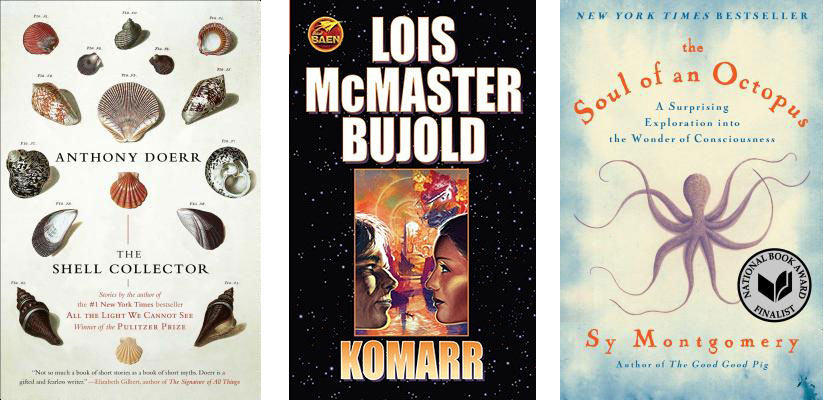
What are you reading now?
I’m reading Anthony Doerr’s collection of short stories, The Shell Collector. I’ve only just begun but find myself entranced by the title story, sucked in by the lure of the unfamiliar: the location in East Africa, the idea of being a blind shell collector and most of all, the exotic shells themselves and the creatures that inhabit them. As a writer, I read some of Doerr’s descriptions with awe and a little envy. On one page I find “a crab-guarded socket in the coral” and “a tiny tessellated cone.” Tessellated — what a delightful word. It is perfectly descriptive, has a pleasing sound and is also a little bit exotic—not a word commonly used in every day conversation. In short, I’m finding the first story in this collection a pleasure on many levels and I’m looking forward to seeing how the other stories compare.
What did you read last?
I like to re-read books, and when I’m under the weather I almost always pull out some old faithful. The books I choose in this situation aren’t mentally challenging, not even on the first read. What they all have is a character, or a group of characters, that I like and a world that is a respite to sink into.
The book that I turned to for this latest bout of illness was Komarr, part of a sci-fi series written by Lois McMaster Bujold. Komarr is toward the end of a series of about ten books based on a male character, Miles Vorkosigan. In the first book he’s 17 or 18 and in the last book I read he’s pushing 40. He lives in a world where humans have spread from Earth to inhabit many planets but there are no other sentient beings. The ethos of the planets varies. One, for example, is uber-liberal — a kind of Scandinavia on steroids. Miles’s planet is authoritarian, militaristic and unforgiving of mutations. Miles is smart and the son of a powerful man but he was damaged in utero and so is only 4’9”. He’s got a chip on his shoulder and over the course of the series you get to watch him grow up and deal with his reality. The stories are enjoyable, some of the side characters are well-developed and I like Miles. He and his world are a comforting place to go visit when I’m feeling ill.
What are you reading next?
For Christmas I bought my husband The Soul of the Octopus: A Surprising Exploration into the Wonder of Consciousness by Sy Montgomery. I usually try and buy him a book (or books) that seem just perfect for him. I confess that I bought this one knowing he’d likely enjoy it but if he didn’t—oh well, I certainly wanted to read it. Learning about octopuses (apparently it is octopuses and not octopi because octopus is derived from Greek, and you don’t plunk Latin endings onto Greek-derived words) would be a good enough reason for me to take a look at this book but I’m also interested to see the author’s approach to the subject since she didn’t start out as an octopus expert. She developed an interest and then threw herself into research — I can relate to that — and I’m looking forward to seeing how she handles it.
Whatcha Reading, Alix Christie?
Every week we ask an interesting figure what they're digging into. Have ideas who we should reach out to? Let it fly: info@seattlereviewofbooks.com. Want to read more? Check out the archives.
Alix Christie is a writer and journalist based in London. Her novel Gutenberg's Apprentice (which I absolutely adored) came out in 2014. She's at work on a new novel about her Scots ancestors in the Pacific Northwest.
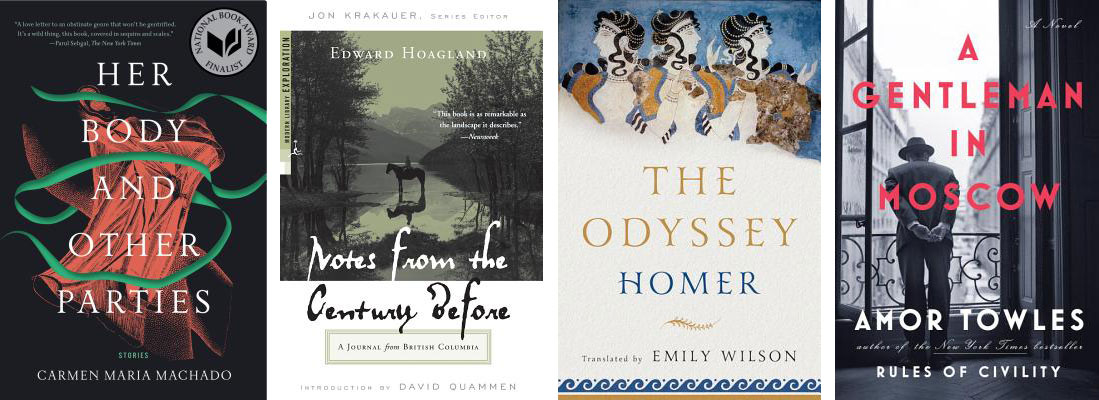
What are you reading now?
Almost finished Her Body & Other Parties by Carmen Maria Machado. These stories are blowing my mind. On the one hand they're visceral, sexy, physical, and on the other fantasmagorically surreal — yet also terrifyingly plausible. Each one is a take on the obliteration of the female body, the violence to which it is constantly prey in this society. Yet they're dreamlike, logical, beguiling—brilliantly devised. I am in awe of her imaginative power and look forward to reading much more.
What did you read last?
A remarkable travelogue, Notes from the Century Before: a Journal from British Columbia by Edward Hoagland, in the Modern Library Exploration Series. It describes a 1966 journey through the roadless B.C. interior east of the Alaska panhandle. I can't remember ever reading such astonishing descriptions of landscape and people. Hoagland has a razor eye and manages to marry physical traits with moral or metaphysical ones: one fellow "has a rather strange biblical face, rather like Lincoln's"; he looks "as though his face were younger underneath the skin than outside." Nor could I have imagined so many different and precise ways to depict rough and turbulent landscape: "The mountains around were like modern war. … Chains of them extended on in laughing, awesome serration to the four skylines, not a hero among them, just a fierce mass of tire irons and short knives." Some of his attitudes are dated, but the man wields absolutely extraordinary prose.
What are you reading next?
It's a toss-up between the first translation by a woman of Homer's The Odyssey and an enjoyable historical novel, in this case A Gentleman in Moscow which a sophisticated reader friend enthusiastically recommends. I admit to not ever having read the Odyssey, but reports of the brilliance and clarity of Emily Wilson's translation convinced me to buy the book. She apparently conveys Homer's women with more insight, and the opening line is a stunner: "Tell me about a complicated man." We're talking 500+ pages though, and my hibernating winter self is sorely tempted by what I am told is Amor Towles' uplifting story of a man with integrity and heart. I'll keep you posted.
Whatcha Reading, Dawn McCarra Bass?
Every week we ask an interesting figure what they’re digging into. Have ideas who we should reach out to? Let it fly: info@seattlereviewofbooks.com. Want to read more? Check out the archives.
Dawn McCarra Bass is the Associate Editor of the Seattle Review of Books, as well as a voracious reader and writer. It was fun to hear what she picks up when she's not editing reviews and reading all those long internet articles for the Sunday Post.
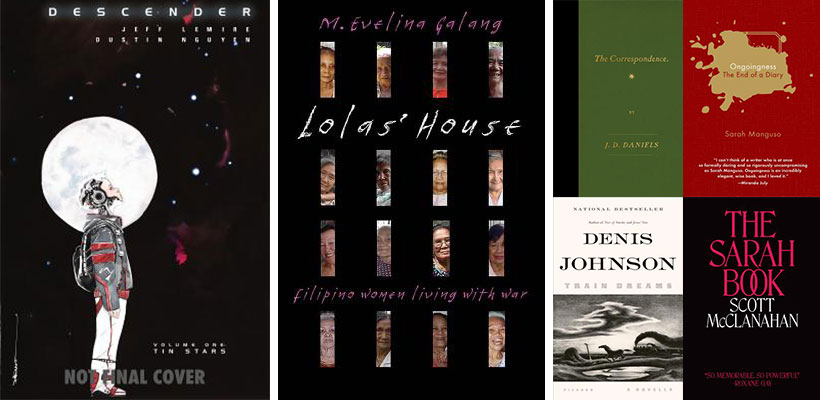
What are you reading now?
I just started Descender, by Jeff Lemire and Dustin Nguyen. I've been collecting single issues unread since April 2015, apparently. (I have a bad habit of hoarding books I expect will be good — against, I guess, some downturn in fortune when I'll need them. Book of Dust, Acceptance, I'm looking at you.)
I am batshit, batshit crazy about Jeff Lemire; he does loneliness and desolation with exceptional clarity and grace. He doesn’t push self-pity on his characters or ask the reader to feel pity for them — just reminds you how human it is to be lost — whether he’s writing about an over-the-hill hockey player or, in this case, a little boy who’s an android. And the art by Nguyen is gorgeous, utterly signature to the series and yet infinitely adaptable to its moods.
What did you read last?
Lolas' House, by M. Evelina Galang, which captures the stories of a group of Filipino women who were held in Japanese rape camps during World War II. It went on my list while I was working on Donna Miscolta's review and finally made it to the top. It's a hard book to read; I did it in two days, then had a hangover for a week. But it's brilliantly done. Galang intersperses testimonials from the lolas, grandmother-aged women who were anywhere from 12 to 24 when they were abducted, with her own emotional and physical experience both of knowing the women and of re-living their stories with them. Were you inclined to intellectualize, she refuses to let you do it, you have to live it right along with her.
I’m not always able to read the books our freelancers cover, but I like to when I can. Our writers are fucking amazing, and their perspectives are so interesting that I can’t resist going to see for myself.
What are you reading next?
I wish I knew. I have two books sitting next to me right now, and one of them is wrapped up in brown paper with a "Phinney by Post" stamp on it — the first of the year. The other is The Correspondence, by J. D. Daniels, picked after a bit of browsing because it looked like it might fit one of my favorite categories: small, personal, surprising books. Physical format, book design, and guesswork . . . It's how I came across Maggie Nelson's Bluets, Sarah Manguso's Ongoingness: The End of a Diary, Denis Johnson's Train Dreams, Scott McClanahan's The Sarah Book. Also incredible curation by booksellers, of course, who I'm pretty sure "force" them off the shelves like cardsharps.
Whatcha Reading, Donna Miscolta?
Every week we ask an interesting figure what they're digging into. Have ideas who we should reach out to? Let it fly: info@seattlereviewofbooks.com. Want to read more? Check out the archives.
Donna Miscolta is a Seattle-based writer, most recently of the story collection Hola and Goodbye, and a frequent contributer to the Seattle Review of Books.
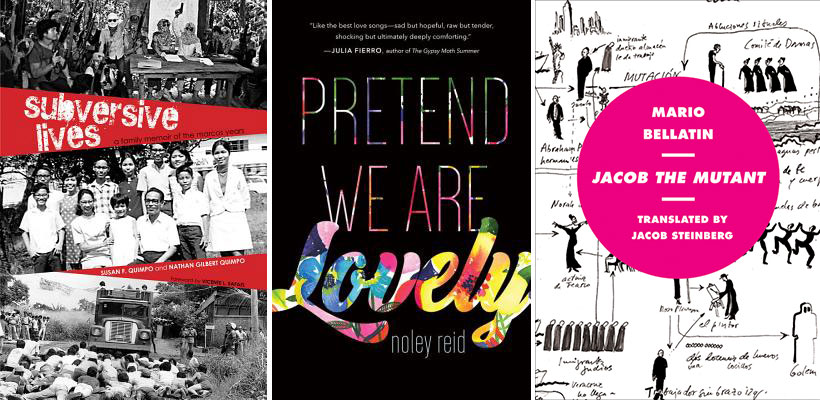
What are you reading now?
I’m reading Subversive Lives: A Family Memoir of the Marcos Years. Authorship is attributed to Susan F. Quimpo and Nathan Gilbert Quimpo who combined their separate accounts of life (and death) during the Marcos regime. However, the two siblings sent the merged manuscript to their other siblings who also ended up contributing to the text. They were ten siblings in all — bookish, physically slight teenagers or young adults who were involved in one way or another in the resistance, drastically changing their lives. Some were detained in camps, some eventually left the country, two were disappeared. Highly readable and thoroughly captivating.
What did you read last?
I read Pretend We Are Lovely, a novel by Noley Reid. It shows the unraveling of a family in the aftermath of unspeakable loss complicated by distorted relationships with food and unmet needs for emotional nourishment. The story is told from multiple points of view, often with quick cuts between characters that magnify their individual and shared crises. I read Reid’s story collection So There! a few years ago and loved the grace of her prose and how she brings us nose-to-nose with the flawed humanity of her characters.
What are you reading next?
Mayumi Tsutakawa gave me a copy of Jacob the Mutant by Mexican novelist Mario Bellatin, so I’m going to give it a try. Experimental fiction is a challenge for me. The book is a compact little thing, which makes it all the more scary. I fear the ambiguity, enigma, and cunning compressed in those pages that will slip right past my traditionalist mindset. But it has a fabulous cover, so I’m intrigued.
Whatcha Reading, Kevin Craft?
Every week we ask an interesting figure what they're digging into. Have ideas who we should reach out to? Let it fly: info@seattlereviewofbooks.com. Want to read more? Check out the archives.
Kevin Craft is the director of the Written Arts Program at Everett Community College, a poet, and longtime editor at Poetry Northwest. He's also our Poet in Residence for January.
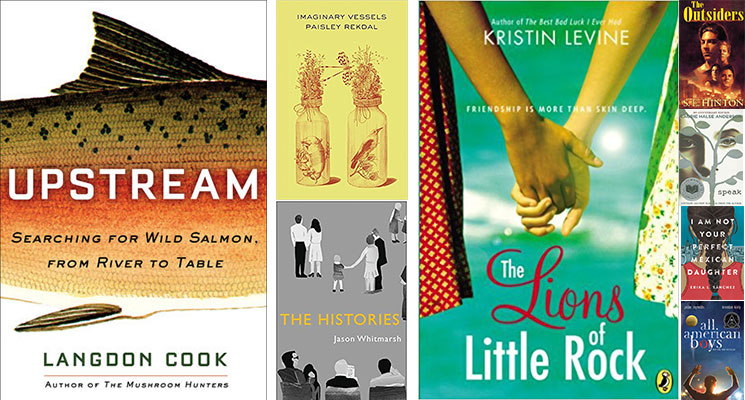
What are you reading now?
I'm just finishing Langdon Cook's Upstream: Searching for Wild Salmon from River to Table. It's an adventurous book — a wilderness of reportage, zigzagging all over the Pacific northwest, from Sacramento, CA to Cordova, AK, from the mouth of the Columbia to the source of the Snake, investigating in detail the history and current status of wild salmon populations. We get the big picture from this book: Native practices, the plundering greed and hydro-technical faith of Euro-settlers that caused salmon populations to plummet, the mixed blessing of the hatchery programs, the wild runs that remain. Cook connects it all to the way we live now: how salmon finds its way to supermarkets and restaurants and backyard grills. His prose is colorful, punchy, brisk — driven by a profound if understated sense for the tragedy of environmental degradation, though his real skill is hooking in the many fascinating, territorial characters who make a living around salmon, bringing their hopes and struggles for a sustainable future to the page.
What did you read last?
I recently finished reading Paisley Rekdal's Imaginary Vessels (Copper Canyon Press, 2016), alongside Jason Whitmarsh's The Histories (Carnegie Mellon Press, 2017) with a group of poetry students. I was interested in exploring what is sometimes called "documentary poetics" from two very distinct angles. Rekdal's book is a brilliant example of this kind of writing: it is many documentary angles in and of itself, including a suite of recombinant sonnets written in the voice of Mae West, and sequence of sonnets paired with photographs of anonymous skulls found buried in a Colorado state mental institution. The abiding pathos with which Rekdal restores these lost voices, the comical and the tragic, deepens our sense of what poetry, as vessel and vicissitude, can accomplish in a time when public memory is all slippery slope and sloppy lies. By comparison, Whitmarsh's table of contents (most begin with the title "History of...," such as "History of Therapy" and "History of Language") reads like the course curriculum of an eccentric liberal arts degree. Most are prose poems, short fables of modern life infused with wry, quiet humor. The prevailing voice is detachment — the dead-pan mode of Lydia Davis comes to mind — detailed like a scientific proof of some elusive emotional experience. As "documentary," these poems remind us that the facts of history may be hard to nail down, but we live inside our own fictions anyway, and we're better off learning how to navigate the absurd than pretending the world can ever be made right or whole or perfectly understood.
What are you reading next?
I have a number of books lined up for a new course I'm teaching in Young Adult Literature, starting with Kirstin Levine's The Lions of Little Rock. It's such a great, eye-opener of a story, depicted in smart detail from the perspective of a shy middle school girl struggling to find her voice. I plan to revisit The Outsiders, and move from there through some recent classics and hopeful bestsellers in the genre — Laurie Halse Anderson's Speak, Erica Sanchez's I Am Not Your Perfect Mexican Daughter, Reynolds & Kiley's All American Boys, and others like it. Finding voice is a natural theme of adolescence, of course. So is parsing right from wrong, learning how to recognize truth, forming moral character and judgment. I'm interested in seeing how these themes play out in stories addressing social justice, group adhesion or exclusion, racial segregation, gender conformity, the works. I've got my hands full, no doubt. We'll see how it goes — I'm excited to discover what my students are thinking and seeing now.
Whatcha reading, Lauren Cerand?
Every week we ask an interesting figure what they're digging into. Have ideas who we should reach out to? Let it fly: info@seattlereviewofbooks.com. Want to read more? Check out the archives.
Lauren Cerand is a literary publicist extraordinaire, PR rep, and strategic consultant based out of New York (and, full disclosure, a previous sponsor of the SRoB). She's working on great stuff this year: new works by Tayari Jones, Molly Crabapple, Daniel Handler (as well as Lemony Snicket), the Windham-Campbell Prizes, and Relegation Books.
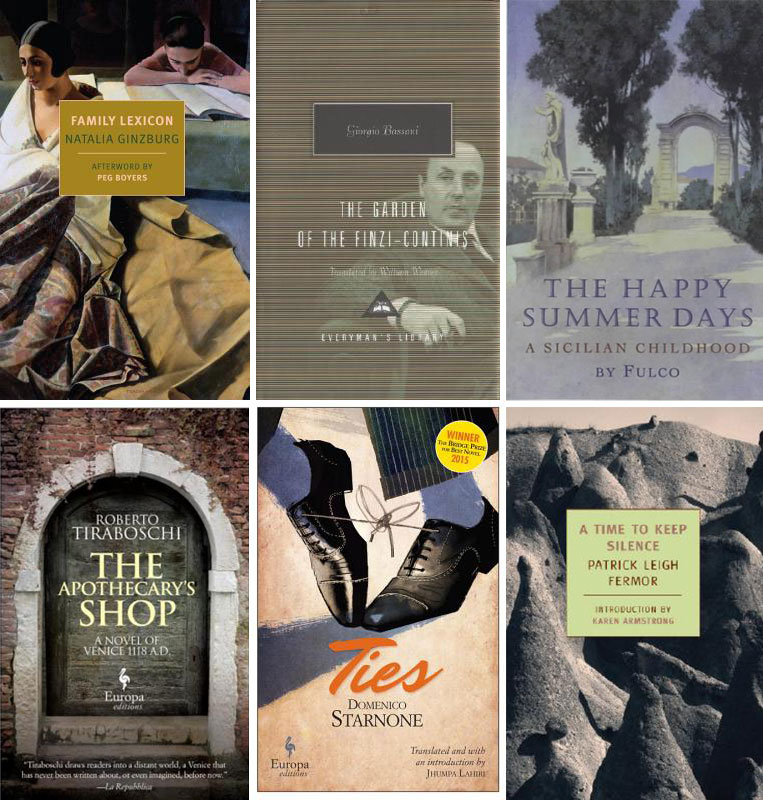
What are you reading now?
I have been learning Italian — going to weekly language and conversation classes — for about six months, so I try to read Italian literature and books about Italian culture as often as I can. Right now I'm reading Natalia Ginzburg's Family Lexicon (NYRB Classics), which reminds me in some ways of The Garden of the Finzi-Continis, a novel that absolutely floored me in its depiction of a world of desire and fantasy encroached upon by malevolent forces. Family Lexicon in that in-between genre that we don't have so much here in America, a bit like French auto-fiction, where some elements are obviously novelistic and some are true and even more so, it's not really the point of the exercise. We tend to be obsessed with the idea of an objective truth to the exclusion of all else. The story is about a family living in Turin, their secret jokes and typical idiosyncrasies, and what their anti-fascism will cost them. Right now it's still early in the book, and the heroine's observations about her family, and how they might be different than other families, are richly layered with cultural and historical significance that I'm still puzzling out, sort of like when reading Georges Perec's "I Remember". So I'm taking this one slow, even though it's not a terribly long text.
What did you read last?
Owing to the aforementioned interest in Italian culture, I recently read a mystery, which I wouldn't normally gravitate to in other circumstances. It's called The Apothecary's Shop by Roberto Tiraboschi, and it was published by Europa Editions, which also put out Ties by Domenico Starnone, a novel of a marriage and family relationships that are not what they seem in retrospect. I read that a few weeks back and loved it (and which won a prize like, the next day, so I felt very clever for a moment with my morning coffee). In The Apothecary's Shop, the setting is Medieval Venice, not at all a period that I know much about. It's an extremely elegant intrigue, with cosmopolitan influences that reflect the character of the city, several unlikely plot twists, and the panache to put just enough confidence in the mind of the reader to keep the pages turning quickly. All of the characters are very strange in their own ways and very believable, and fans of Game of Thrones and all of the Law & Order type franchises would really enjoy this one. I thought I knew much more than I did, and discovering how small my vision was delighted me in the end. When I was in Venice in August, I sat for awhile in a garden on the island of Murano, and although it is small, uneventful memory in many regards, it is also a fully-formed one, and this novel was a window into things that might have plausibly happened there a millennium ago.
What are you reading next?
Right now I am waiting for a used copy of The Happy Summer Days: A Sicilian Childhood by Fulco Santostefano della Cerda, Duke of Verdura, who designed jewelry for Chanel, including her iconic Maltese Cross cuffs, and then under his own name, Verdura, inspired by natural motifs, to arrive in the mail. While I'm passing the time, I'll re-read Patrick Leigh Fermor's A Time to Keep Silence, a memoir of retreats spent writing and reflecting in monasteries across Europe. When I was reading Adam Federman's terrific biography, Fasting and Feasting: The Life of Visionary Food Writer Patience Gray last month, the quotable electric zing of her letters ("Everything that grows has its peculiar grace."), her commitment to personal originality, and her wandering ways reminded me Fermor, and so I went to find the book of his that I own on my shelf, and wouldn't you know, it's just the right one.
Whatcha Reading, Leni Zumas?
Every week we ask an interesting figure what they're digging into. Have ideas who we should reach out to? Let it fly: info@seattlereviewofbooks.com. Want to read more? Check out the archives.
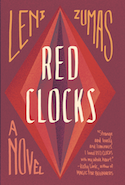
Portland writer Leni Zumas is author of the 2008 story collection Farewell Navigator and the 2012 novel The Listeners. Her latest novel, Red Clocks, is being released by Little, Brown this Tuesday, the 16th. She'll be appearing the following evening, Wednesday the 17th, at the Elliott Bay Book Company at 7:00pm.
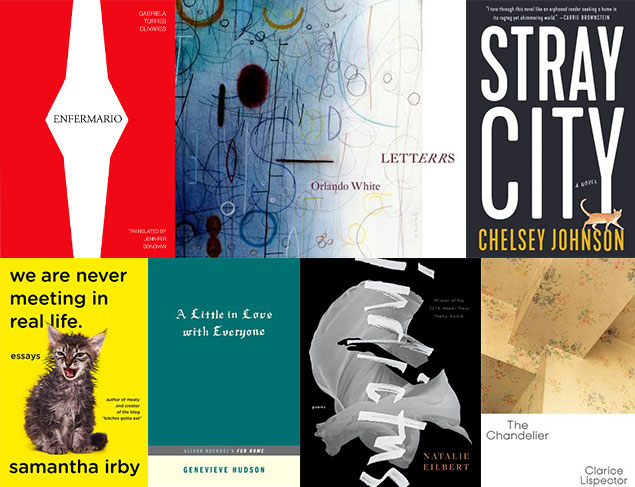
What are you reading now?
A gorgeous and gutting book of fictions called Enfermario, by Gabriela Torres Olivares, translated by Jennifer Donovan — full of bodies leaking, aching, desiring, refusing — and an exquisite poetry collection by Orlando White, who is Diné of the Naaneesht’ézhi Tábaahí and born for the Naakai Diné’e. LETTERRS maps the origins, ruptures, and wounds of language.
What did you read last?
I just finished Chelsey Johnson’s terrific debut, Stray City, which is a smart, funny, politically astute novel set in punk-lesbian 90s Portland. Another recent favorite is Samantha Irby’s knife-to-the-ribs essay collection We Are Never Meeting in Real Life. I adore this book, and find myself looking for any chance to use her phrase “organizing my ketchups.”
What are you reading next?
At the top of my list is A Little in Love with Everyone by Genevieve Hudson, a hybrid memoir/commentary on Alison Bechdel’s Fun Home. I’m also looking forward to Natalie Eilbert’s poetry collection Indictus and to the first English translation of Clarice Lispector’s 1946 novel O Lustre (The Chandelier), which comes out in March.
Whatcha Reading, Cat Rambo?
New column! Every week we ask an interesting figure what they're digging into. Have ideas who we should reach out to? Let it fly: info@seattlereviewofbooks.com.
Cat Rambo is a Seattle based writer, and current president of the SFWA. Her second novel, Hearts of Tabat, is coming in April.
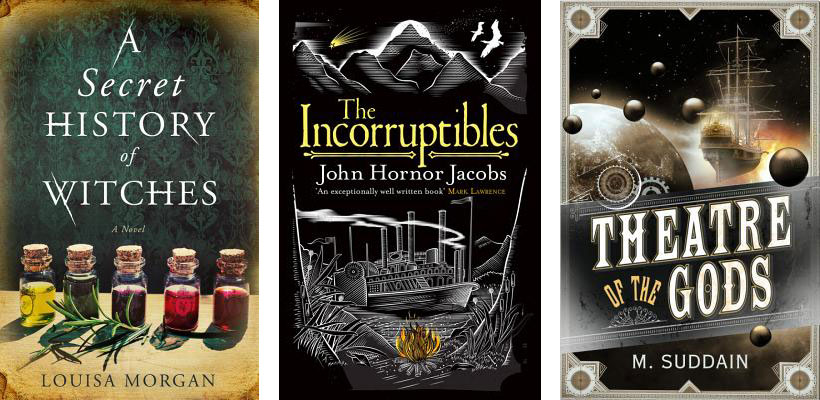
What are you reading now?
Right now I am reading Louisa Morgan's A Secret History of Witches. Morgan's the pen name for local author Louise Marley, whose work I enjoy under any name.
What did you read last?
I just finished up John Hornor Jacob's Incorruptibles trilogy, a wild mash-up of weird Western steampunky stuff with an alternate history where Roman never fell. Highly recommended!
What are you reading next?
Next up is M. Suddain's Theatre of the Gods, which the Guardian described as "like Douglas Adams channeling William Burroughs channeling Ionesco, spiced with the comic brio of Vonnegut." How could I resist something like that?